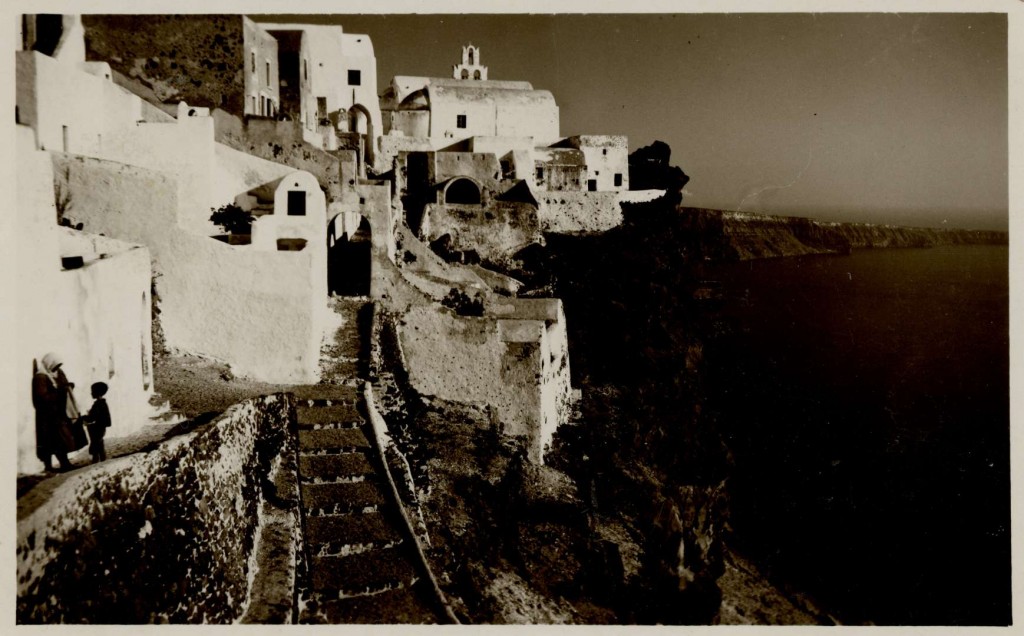Santorini island news
5 villages you have to visit when in Santorini
Reading through our pages you may have realised that Santorini has much more to offer than just black sanded beaches and sunset views. One of the most important things to do while you are on the island is to visit the different traditional settlements, walk along paths of another era and discover unique corners built by ancient civilisations. In the next lines we will be giving you a short description of the best places to visit in Santorini, the famous and the secret ones.
Pyrgos
Situated on the inland of Santorini, Pyrgos Village is built on top of the hill. Arriving at the square of the village you will need to park your car to stroll though the picturesque cobbled streets. The settlement was declared a listed monument in 1995, and since then, the locals have done a great job maintaining the village clean and traditional, as if time never touched it. The goal of the walk is to go as high as possible, getting lost and found again between the labyrinth-like streets. Going to the top may seem a bit tiring, especially during summer, but the endless views of the island lying beneath you will reward your efforts! If you are there at the right time, you will be enjoying great views of the sun setting as well.
Emporio – Kastelli
Following the road toward Perissa beach, you will find Emporio, the largest village of Santorini. Park your car at the main church and climb the stairs up to get in the little alleys of the old part of the village. On the walls and the floors you will find handwritten the word “castle” and an arrow pointing the way. They are referring to “Kasteli”, one of the five typical fortress settlements of the after Byzantine period of the island. Its walls are the external walls of the houses, with only two gates allowing to get in and out, and windows around the walls. All buildings communicate from their roofs, with narrow and steep steps leading there. Right in the centre of the village-fortress, you will find Palea Panagia or Panagia Mesani church. The church is dated back to the 16th century with a unique architecture bell tower and a priceless wooden icon screen.
Finikia
Finikia is only a 2 minute drive from Oia. You may reach it by taxi or car and park right outside the settlement. The village is practically built inside a gorge and fortunately did not to sustain severe damages during the 1956 earthquake allowing to still stand out for its architecture. The Greek poet and writer Kadio Kolimva, quotes that the buildings in Finikia have “…a different kind of wise analogy, because they don’t have to be balanced on the rocks, like the ones built on the Caldera. The houses of Oia talk to the sea, the houses of Finikia talk to the earth…”. The houses are colourful and prickly pears are hidden in the narrow streets. Follow the stairs leading to the roofs, where they used to sun-dry figs and grapes, and peek through old courtyard gates towards gardens and yards of old wineries.
Oia – Ia
Of course, we couldn’t leave out Oia, or Ia. It is the most famous village of the island partly for its sunset views, partly for its gorgeous architecture. Oia has always been the “rich” village of Santorini. All the captains of the island were living there, as it is the northern village and it was easy to sail to the rest of the Aegean sea islands, Athens and Turkey for trade. Coming back to Santorini with trades like marbles and other stones, the locals kept them there, as it was very difficult to move them with the donkeys to the rest of the island. You will thus see marble stone paths and imposing captain houses. Oia is also built only 100 meters above sea level (whereas all the other the Caldera villages have more than 250 meters in altitude), allowing the visitor to enjoy the views of the sea, catamarans and fishing boats from a close distance. Keep in mind that Oia can get very busy during the summer months, so it might be a better experience if you choose to visit it during off peak hours instead of sunset time.
Imerovigli
Imerovigli, or the so called “balcony of Santorini” is situated right in the middle of Fira (the main town) and Oia village. The largest part of Imerovigli was destroyed by the earthquake of 1956 and its residents either built houses outside the Caldera or moved to Athens. Nowadays, the cliff side of Imerovigli is mainly hotels and there are only a few shopping places. Many visitors choose Imerovigli for its magnificent views towards the sunset and the volcano and because it is very quiet, especially when compared to Fira and Oia. If you don’t stay there, Imerovigli is worth visiting for the great quality restaurants and taverns, for walking along the caldera path and for watching the sunset while enjoying your drinks or dinner from The Wine Bar.
More about the villages of Santorini here

